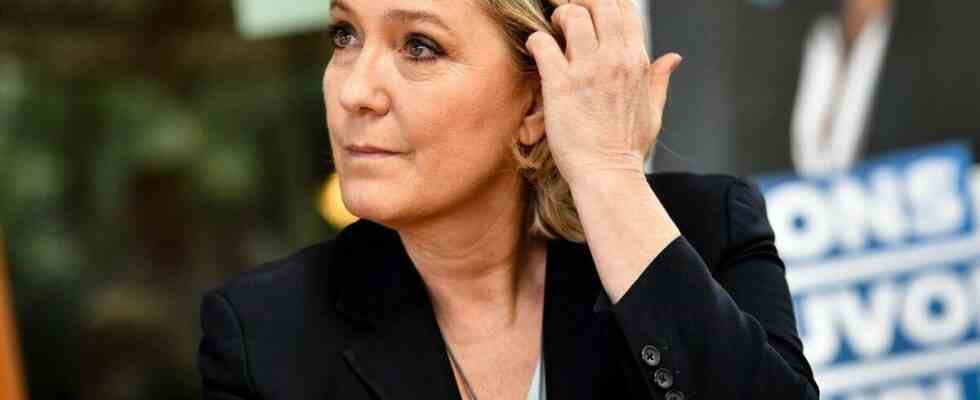The French were called on this Sunday, in the second round of the presidential election, to decide between two projects and two visions of the world that everything opposes. As in 2017, Emmanuel Macron, favorite party, won this second round against Marine Le Pen. The French were faced with a historic choice: to renew the outgoing president or to elect a woman and thus propel the far right to the Elysée. An explosion that would have resonated well beyond French borders, comparable to Britain’s Brexit and the election of Donald Trump in the United States in 2016.
The arrival of Marine Le Pen, 53, at the helm of a nuclear power, with a permanent seat on the UN Security Council, the driving force of the European Union would have been an earthquake of a magnitude of higher as it would have taken place in the heavy context of a war at the gates of Europe.
“The Cat Lady” and Purchasing Power
Marine Le Pen slipped her bulletin around 11 a.m. in her “Marinist” stronghold of Hénin-Beaumont (Pas-de-Calais). The day before, on the last day of the campaign for the second round, the candidate of the National Rally contrasted her relationship with the French with that of the outgoing president, according to her who had come down “from Olympus exclusively for a few days”, and to the “toxic relationship” with the “people”.
Born in Neuilly-sur-Seine, “the cat lady”, who focused her campaign on purchasing power rather than immigration or insecurity, is the youngest child of Jean-Marie Le Pen and Pierrette Lalanne. . After a DEA in criminal law, she became a lawyer at the Paris Bar in 1992. She is the mother of three children, born in the space of eleven months (a girl in 1998 and twins in 1999).
In 1993, she ran for the first time in the legislative elections in Paris (17th arrondissement), under the banner of the National Front (FN), a party co-founded by her father, which she joined in 1986. Then, in 1998, she left the Paris bar to enter the legal department of the FN before obtaining her first political mandate as regional councilor of Nord-Pas-de-Calais (she sat there until 2004 then again from 2010 to 2015 and from 2016 to 2021 at within the new Hauts-de-France region).
A claimed “de-demonization”
In April 2003, Marine Le Pen became vice-president of the FN. Elected to the European Parliament in 2004 – she will sit there until 2017 – she also became regional councilor for Ile-de-France – until 2010. In January 2011, she was elected president of the FN. Four years later, his father will be definitively removed from the governing bodies of the party, renamed National Rally (RN) in 2018 as part of a claimed campaign of “de-demonization”.
The following years, Marine Le Pen will continue to want to smooth her image by smiling a lot. The one who judges that her demonization is the fruit of a media and political “system” which “is afraid” will confess to having “a thousand differences” with her father, who nevertheless supports her. She had even planned to invite him to the Elysée for his hypothetical enthronement. By revealing her passion for cats, Marine Le Pen has softened her image. “Who would be suspicious of a cat lady? wondered even the Jean-Jaurès Foundation.
During the campaign, Marine Le Pen also attacked the strategy of “redemonization” initiated by the outgoing president. She also sought to defeat the notion of a “republican front”, a lever activated in 2002 against her father and then in 2017 against herself to block the far right. ” Tone [de la campagne] changed abruptly between the first and the second round”, she affirmed on Europe 1 and CNews, denouncing the fact that “all the media, institutions trigger the demonization” of her party. “It’s a French tradition, but I find that it’s not a very democratic tradition. »
Dropped by family
Let’s go back to 2012. That year, in April, Marine Le Pen announced her first candidacy for the presidential election. She failed in the first round, finishing third (17.9% of the vote). On May 7, 2017, she was beaten in the second round (with 33.9% of the vote) against Emmanuel Macron. A month later, she was elected MP for Pas-de-Calais, with 58.6% of the vote. On April 10, 2022, despite competition from Eric Zemmour joined by several RN executives, she again reached the second round of the presidential election, with 23.1% of the vote.
Still, his big sister, Yann, supported Eric Zemmour in the race for the Elysée, just like his niece (and daughter of Yann), Marion Maréchal. Marine le Pen can, however, count on the support of her older sister Marie-Caroline and her father.
And this Sunday, if France – and the world – held its breath, it was because the colossal stakes, inherent in any presidential election, were further exacerbated by the possibility of seeing the far right take power. “Millions of our compatriots leaned towards her party and her project because she gave the feeling that she was responding to the problem of purchasing power. But his answers are not viable. An ambiguity has been created, but I think that the fundamentals of the far right are there”, for his part dropped Emmanuel Macron on France Inter on Friday, assuring that his opponent had managed to “advance masked”. “Marine Le Pen is the heiress of a father, a party and an ideology which was also based on a lot of anti-Semitism,” he further accused.
Our file on the presidential
If Marine Le Pen, who declared herself “against wokism and against all “deconstructions””, had seized the Elysée Palace, the tremors would have been felt on Sunday evening. And the next day, it would have been diving into the unknown.
Discover the results of the second round of the 2022 presidential election by city, department and region over 20 Minutes.

